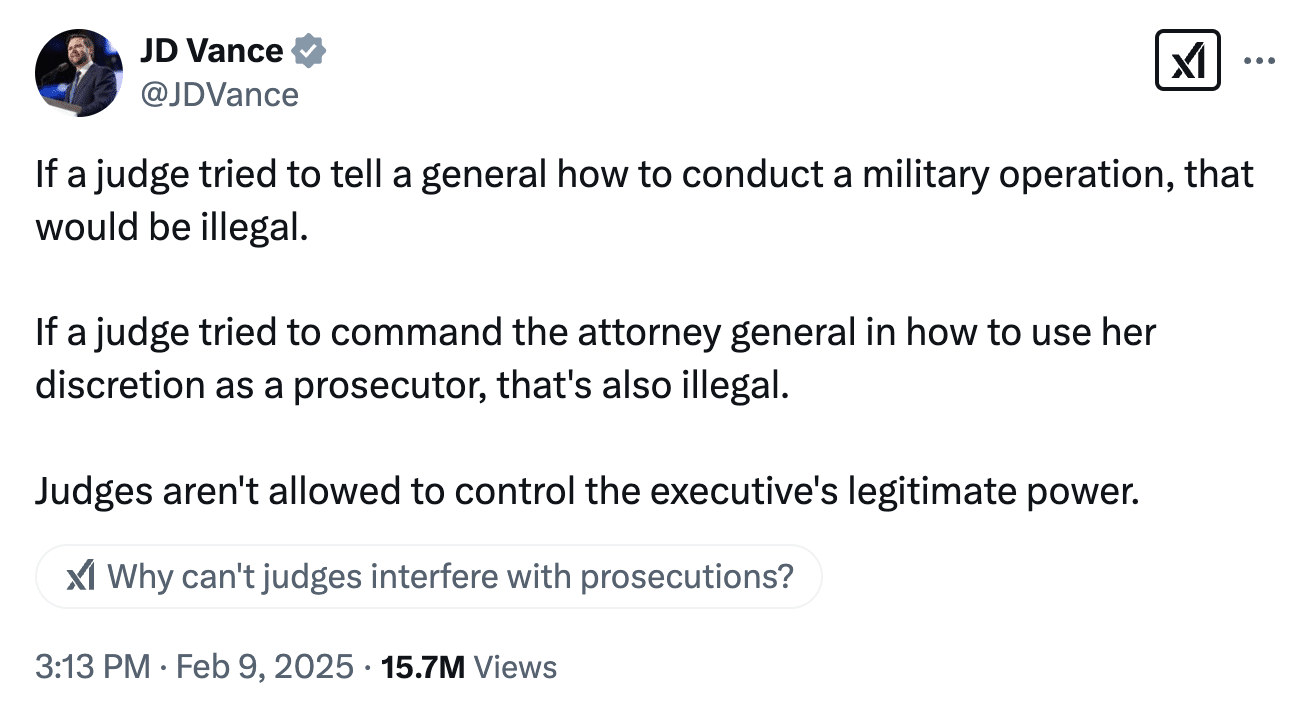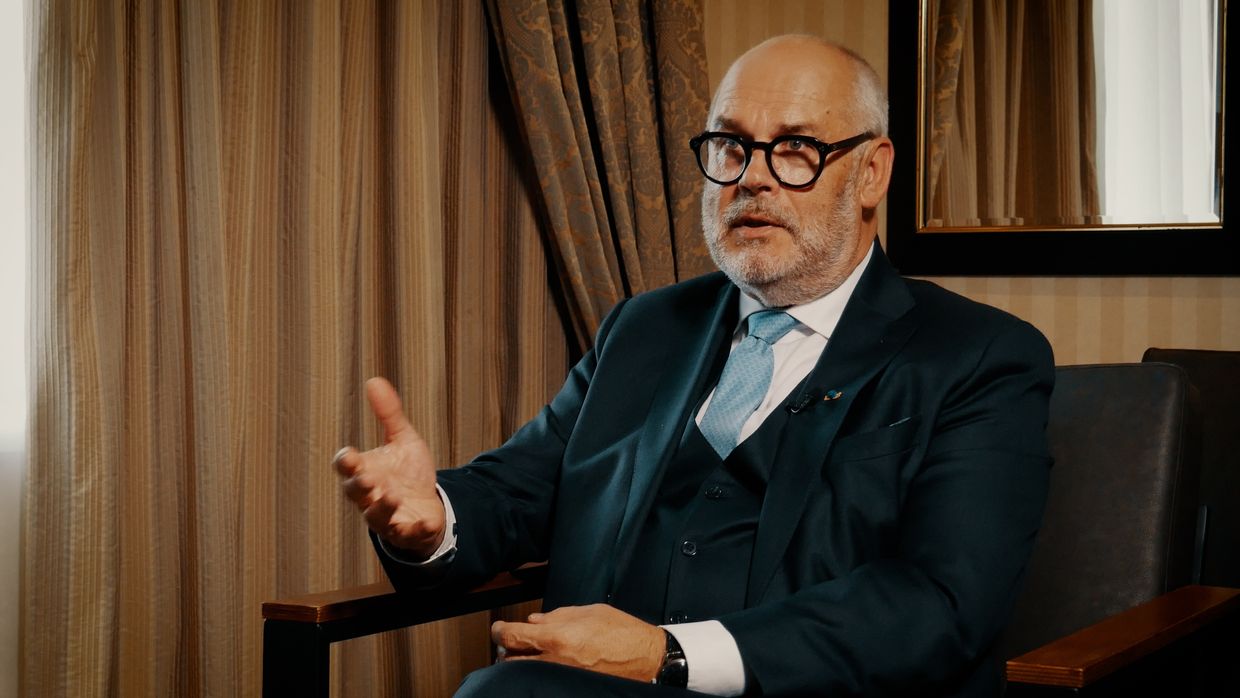For some time, we’ve all been assuming that Trump will defy court orders reining in his assault on the government. And then, in the wake of Judge Paul Engelmayer’s order enjoining Scott Bessent from altering Treasury’s payment system before Friday, JD Vance ran his mouth, convincing everyone that that moment is already here.
Overnight, filings in at least two of the lawsuits against Trump’s attacks suggests that Trump is, at least for now, complying.
- In the Rhode Island case in which states enjoined OMB from withholding government grants the government filed a response describing, among other things, how they’ve worked to ensure payments to Oregon continue.
- In the New York lawsuit, also brought by states, DOJ asked for clarification of the scope of Engelmeyer’s order and opposed the breadth of it (noting, that there were contractors who did work on the system and also listing some senior Treasury officials, political appointees, who needed access). With that, Thomas Krause submitted a declaration saying he’s the only Special Government Employee who currently has permission to access the system (meaning they’re also complying with Colleen Kollar-Kotelly’s order in DC), but also revealing that Marko Elez — the DOGE boy who was included in Kollar-Kotelly’s order — has not returned to Treasury. Krause even notes (as I did) that the order to destroy what Elez has done likely conflicts with the order Kollar-Kotelly issued.
DOJ is pushing at the terms of the orders limiting government actions. But it at least claims it is complying.
There is other conflicting evidence about implementation. I have also seen reports that USAID people stationed overseas were having their access to communications systems restored, in compliance with Carl Nicoles’ order. But WaPo reports that the Administration continues to process resignations in potential defiance of George O’Toole’s order halting the Fork in the Road program.
I don’t doubt that at some point Trump will defy the courts. But for a number of reasons, I suspect they won’t outright defy judges yet.
One main reason is obvious: Trump and Russ Vought want John Roberts to grant him the authority to — basically — neutralize Congress’ power of the purse. To do that, he needs a clean appellate record. So he has to go through the process of engaging in good faith (even while arguing, as he did in his response to the Engelmeyer order, for a maximal theory of Executive power).
Another reason likely has to do with Pam Bondi. She has her own malign goals for DOJ, such as a likely assault on medical abortion pills, both between and within states. Plus, she is pursuing Trump’s attacks on sanctuary states.
But to use DOJ for these policy purposes, there has to be a DOJ, with attorneys more competent and experienced in Federal litigation than Ed Martin, the Acting US Attorney in DC. With the possible exception of the birthright citizenship defense, DOJ has real AUSAs fighting these cases, AUSAs who are going to be unwilling to risk their bar license on frivolous legal arguments or lies.
Finally, I think DOJ is in a risky situation in its confrontation with attorneys and FBI personnel. Ben Wittes noted recently, the Administration needs the FBI, in ways it doesn’t need USAID personnel, at least not in the same potentially catastrophically visible way they need the FBI.
The FBI rank and file have power in this equation that other agencies, such as USAID, for example, do not have. The Trump administration does not need USAID. It wants to eliminate foreign aid anyway, so if the personnel at the aid agency get uppity, who cares? And if they quit? All the better.
The FBI is not that simple. For one thing, the administration does need law enforcement. If there’s a terrorist attack, and there will be, and the FBI is not in a position to prevent it or investigate it quickly and effectively, the administration will take the blame.
This administration also draws its legitimacy from backing the blue. Even in their war on the intelligence community, Donald Trump and his people always tried to distinguish between the rank and file and the “bad apples” who were running things. Waging a full-scale war against the nation’s premier law enforcement agency, a war that is all about targeting street agents for having done their jobs, is a dangerous game—far different from sacking an FBI director, or even two, who went to some elite law schools and served at the upper levels of the Justice Department.
Then there’s the problem of capacity. FBI agents are actually very hard to replace—good ones are, anyway. The physical demands are significant. Most have specialized education of one sort or another. And while people often imagine FBI agents as glorified cops who kick doors down, the truth is that a lot of agents have exquisitely specialized expertise. The training of a good counterintelligence agent takes many years. Some agents have specialized scientific training. There are even agents who specialize in art theft. Take out a thousand FBI personnel for political reasons, and you destroy literally centuries of institutional capacity. A good FBI agent is much harder to create than, say, a good assistant U.S. attorney.
The confrontation with FBI has allowed accidental hero, Brian Driscoll (who is only serving as Acting Director as opposed to Acting Deputy Director because the White House made an error), has played this well, including by raising his own profile and the successes of the FBI.
That hasn’t stopped DOJ from demanding loyalty pledges, in the form of treating the mob that violently attacked cops and the Capitol as more patriotic than the cops themselves or the Members of Congress who did their duty — effectively (though WaPo doesn’t make this clear) forcing FBI agents to disavow treating a violent attack as a crime. But that, in turn, risks real backlash.
To be sure, there’s a lot of garbage that’s being dealt here. DOJ told Colleen Kollar-Kotelly that DOGE at that point only had read-only access to Treasury data (which Anna Bower recognized as an attempt to parse). But a footnote in the overnight filing in New York confesses that’s false.
Since January 20, 2025, one other Treasury employee—Marco Elez—had “read only” access to or copies of certain data in BFS payment systems, subject to restrictions, and access to a copy of certain BFS payments systems’ source code in a “sandbox” environment. Krause Decl. ¶ 11. Mr. Elez resigned on February 6, 2025 and returned all Treasury and BFS equipment and credentials the same day. Id.
That footnote cites Krause’s declaration. But the bit about the sandbox copy is not in the cited paragraph.
Since January 20, 2025, one other Treasury non-career employee—Marko Elez—had access to BFS payment systems and payment data covered by the order. Mr. Elez resigned on February 6, 2025, and returned all Treasury and BFS equipment and credentials the same day. Treasury staff have quarantined and disabled access to all devices and accounts used by this individual, which can now only be accessed by civil servants with a need for access to perform their job duties within the BFS who have passed all background checks and security clearances and taken all information security training called for in federal statutes and Treasury Department regulations. Further, based on technical controls in place, BFS oversight of Mr. Elez’s work, instructions provided to Mr. Elez regarding proper data handling, and subsequent technical review of his activities, I currently have no reason to believe Mr. Elez retains access to any BFS payment data, source code, or systems. I am concerned that deleting the contents of these accounts and devices would violate Treasury’s document preservation duties in connection with related litigation entitled Alliance for Retired Americans, et al. v. Bessent, et al., Civil Action No. 25-0313 (CKK) (D.D.C.).
Similarly, an OPM suit may well prove that DOJ has misrepresented other claims to courts. And as the FBI lawsuits hung overnight, DOJ forced Driscoll to provide names of all the FBI Agents who worked on January 6 cases.
But these discrepancies may well be useful. At the very least, it provides cause for the AGs to insist that Krause appear before Judge Jeannette Vargas, the judge assigned to the case (who ordered the parties to try to clarify Saturday’s order) to explain what Elez was doing with his sandbox and why anyone should believe he hasn’t been rehired, somewhere, to play in his sandbox some more. That, in turn, would support the very cybersecurity arguments that various lawyers are trying to make. And it’ll advance the reporting already going on.
JD Vance might well like to simply ignore Engelmeyer’s order. Mike Davis might want Trump to appeal this immediately to SCOTUS. Trump might want to start siccing his mob on judges.
But there are good reasons to believe that that won’t happen, yet — at least not until Trump gets a few more of his national security and DOJ nominees through the Senate.
And until then, this legal process is a tool — a tool that can be used to buy time, but also a tool to use to hem in Trump’s mob.


:max_bytes(150000):strip_icc()/Wendys-Secret-Menu-Item-FT-BLOG0225-74124319b9b14d07bc058750e116430f.jpg)













